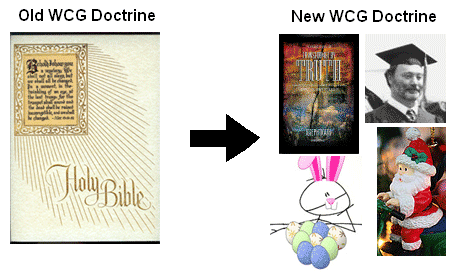GCI’s Tkach promotes Valentine’s Day
TRANSFORMED FROM TRUTH

A few moments ago, I received an email from J. Tkach of GCI (Grace Communion International, essentially the group that for a time ran the ‘new’ Worldwide Church of God) where he promotes Valentine’s Day:
Every year on Valentine’s Day I get my wife a card and a bouquet of her favorite flowers. …
This year I want to remind us of the way Christ received love from his Heavenly Father, and lived out his perfect love for us – by showing us the Father and sending the Spirit – through patient, humble service to others. I want to wish you a very happy Valentine’s Day and pray that the Lord continues to bless all your relationships.
Valentine’s Day is not a holy day about love, but a repackaged pagan holiday about lust.
Jesus never kept it nor did His disciples, even though Lupercalia (a predecessor to Valentine’s Day) was kept when they were around.
The improperly named Christianity Today made the following observations about the origin of Valentine’s cards:
So why do people send “valentines” or “love-tokens” to one another on that day? The origin of that tradition is not thought to have any connection with the saint’s day. Rather it comes from an early European belief that the second week of February was when birds began to mate. (History of Valentine’s Day, 2007)
By the end of the second century, some of the compromisers did celebrate something in the late December time period, but it had nothing to do with Jesus’ birth.
Valentine’s Day has its origins in paganism and basically is a holdover of a Spring fertility/fornication holiday.
Even the old World Book Encyclopedia (Valentine’s Day. Volume 19. 1966, pp.205-206) states:
…the customs of the day have nothing to do with the lives of the saints. They probably come from an ancient Roman festival called Lupercalia which took place every February 15. The festival honored Juno, the Roman goddess of women and marriage, and Pan, the god of nature…The Romans celebrated their feast of Lupercalia as a lovers’ festival for young people. Young men and women chose partners for the festival by drawing names from a box…After the spread of Christianity, churchmen tried to give Christian meaning to the pagan festival. In 496, Pope Gelasius changed the Lupercalia festival of February 15 to Saint Valentine’s Day February 14. But the sentimental meaning of the old festival has remained to the present time.
One would think that Dr. Tkach would not promote a holiday he knows is pagan and does not come from the Bible. But, he does.
The simple fact is that early Christians did not have a holiday like Valentine’s Day. If God wanted it celebrated, perhaps some admonition to observe it, would be in the New Testament. Compromisers who claimed to be Christian could not pass up a celebration like Lupercalia, and others went along with it–even condoning such actions is warned against in the Bible (cf. Romans 1:18-32).
Of course, history shows that there were actual Christians who would not follow the compromises that many made. And there still are such Christians today. What about you?
Some items of related interest may include:
Valentine’s Day: Its Real Origins Christianity Today suggests that Valentine’s Day is good for Christians to observe. Is this true? There is also a YouTube titled Should Christians Observe Valentine’s Day? A more detailed sermon is available and titled Valentine’s Day, Christianity, and Islam.
What Does the Catholic Church Teach About Christmas and the Holy Days? Do you know what the Catholic Church says were the original Christian holy days? Was Christmas among them? Is December 25th Jesus’ birthday or that of the sun god? Here is a link to a related sermon: What do Catholic and other scholars teach about Christmas?
Did Early Christians Celebrate Birthdays? Did biblical era Jews celebrate birthdays? Who originally celebrated birthdays? When did many that profess Christ begin birthday celebrations?
Is There “An Annual Worship Calendar” In the Bible? This paper provides a biblical and historical critique of several articles, including one by the Tkach WCG which states that this should be a local decision. What do the Holy Days mean? Also you can click here for the calendar of Holy Days.
The History of Early Christianity Are you aware that what most people believe is not what truly happened to the true Christian church? Do you know where the early church was based? Do you know what were the doctrines of the early church? Is your faith really based upon the truth or compromise?
Where is the True Christian Church Today? This free online pdf booklet answers that question and includes 18 proofs, clues, and signs to identify the true vs. false Christian church. Plus 7 proofs, clues, and signs to help identify Laodicean churches. A related sermon is also available: Where is the True Christian Church? Here is a link to the booklet in the Spanish language: ¿Dónde está la verdadera Iglesia cristiana de hoy?
Continuing History of the Church of God This pdf booklet is a historical overview of the true Church of God and some of its main opponents from c. 31 A.D. to 2014. Two related sermon links would include Continuing History of the Church of God: c. 31 to c. 300 A.D. and Continuing History of the Church of God: 4th-16th Centuries. In Spanish: Marque aquí para ver el pdf folleto: Continuación de la Historia de la Iglesia de Dios.
 |
Tweet |
|